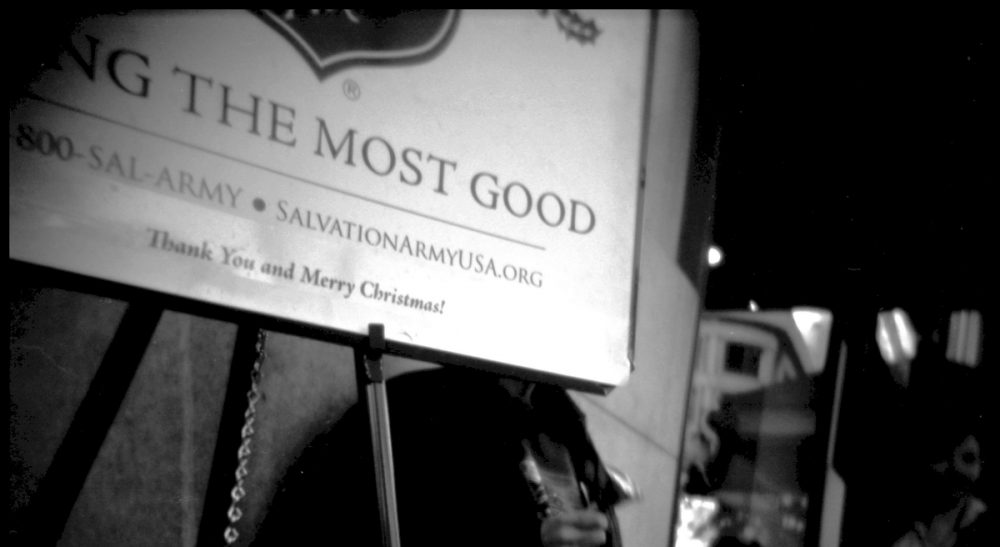Advertisement
The Christmas Job

“Do you get paid for this?” I asked the man ringing the bell for the Salvation Army.
It had been a rough fall. I was a recent college graduate, an English major with a Bachelor’s degree but little money and less prospect of work. I’d arrived in San Francisco hoping to land a job, any job, in publishing, but no one seemed to be hiring, so I had embraced the adventure of working outside my expectations.
What was I doing standing in the winter rain garbed in private’s hat and an overcoat that grazed my ankles and that was five sizes too big?
I’d waitressed at a Greek restaurant in Berkeley, which did not pay the rent. I’d tended bar in a rough East Oakland hangout, until a patron yanked the phone off the wall in a beer bottle brawl, stranding me in a battlefield of brown and green glass.
And that very morning, I’d spent three hours waiting (and hoping) to be interviewed for a Christmas job at the Emporium, San Francisco’s then-bustling department store. No such luck. More than 300 of us had responded to a newspaper ad for some 30 seasonal positions.
The bell ringer stood outside the Emporium’s distinctive archway.
I inched closer and blurted out, “I need a job.”
He looked up: “Talk to Major Galbraith at Salvation Army headquarters. She’s at 101 Valencia Street.”
Stepping off the Market Street bus, I felt suddenly aware of the run in my left stocking, the scuffed appearance of my good, black flats, and the wild look of my mane of long, dark curls.
Major Galbraith appeared as tidy in her crisp navy blue uniform and shiny low-heeled pumps as I felt disheveled. I was sheepish about applying for this job: I didn’t know anything about the Salvation Army or who was saving whom and why you needed an army to do it. To make matters worse, I wasn’t even Christian. I was Jewish, although only by heritage; in my family, progressive politics and theater were as close as anyone got to religion.
I worried that Major Galbraith might find me unqualified, but she seemed interested in me. After she had draped me in a oversized man’s overcoat that would serve as my Salvation Army uniform, she placed a private’s cap atop my curls and stood me in front of a full-length mirror, smiling approvingly. She handed me a red plastic collection box and told me to meet her at Fisherman’s Wharf at 9 a.m.
Advertisement
The next morning, I found myself among an odd assemblage of seasonal hires: hippies, students and scruffy older men with the faraway gaze of the bell ringer I’d met outside the Emporium. Major Galbraith shepherded us into a van, dropping us off at selected spots. We were to be paid $2.50 an hour, a fair wage in 1973.
The first morning on the job, I almost lost my nerve. What was I doing standing in the winter rain garbed in private’s hat and an overcoat that grazed my ankles and that was five sizes too big? Poised on a street corner with my shiny red collection box, I felt like a teenager again, paralyzed by self-consciousness. I was ready to quit. To give up the dream of making it on my own in San Francisco. To write my father for help buying a ticket Back East. But something more than my own stubbornness caused me to bind my hair, straighten the hat, and give the work another try. I held out the red container and managed a smile. Little by little, people responded with coins.
To keep from being bored, I adopted different accents: Irish, English, French, German and Southern. They kept me going when I was tired, hungry and cold. Afternoons were toughest, when the crowds thinned and a bone-chilling fog swept in off San Francisco Bay.
To keep from being bored, I adopted different accents: Irish, English, French, German and Southern. They kept me going when I was tired, hungry and cold.
The days took on a rhythm: I appealed for donations in the imagined accents of characters from my favorite books. I began in Joyce’s Dublin, then switched to Dickens’s London and Faulkner’s Mississippi. The more animated I became, the more people paused to listen and donate. I became so effective at solicitations (or so obviously in need of charity myself) that Major Galbraith kept me on after Christmas.
But as winter turned into spring, I became increasingly restless. My father’s letters, urging me to return to New York, did not help. He was worried. Worried I would join the Salvation Army. Soon after I secured my Fisherman’s Wharf position, he sent me his dog-eared copy of “Major Barbara.” George Bernard Shaw’s satirical play is about a morally righteous young woman, a zealous, if somewhat deluded, saver of souls, who becomes disillusioned with the Salvation Army after she learns that it has accepted a sizable contribution from her father, an arms manufacturer. She decides to bring her message of salvation elsewhere. I knew I was in no danger of becoming the playwright’s eponymous protagonist.
Quite the contrary: I felt like an impostor. My work did help support the Salvation Army’s many good causes. I was grateful for that and for being treated well and paid fairly. But my heart was not in the job. It was time to turn in my uniform. Time to let go of the pretend accents and move on. With my Salvation Army earnings, I bought a bus ticket to New York, where I eventually landed a job on a newspaper, a first step toward becoming a writer and finding my own voice.
